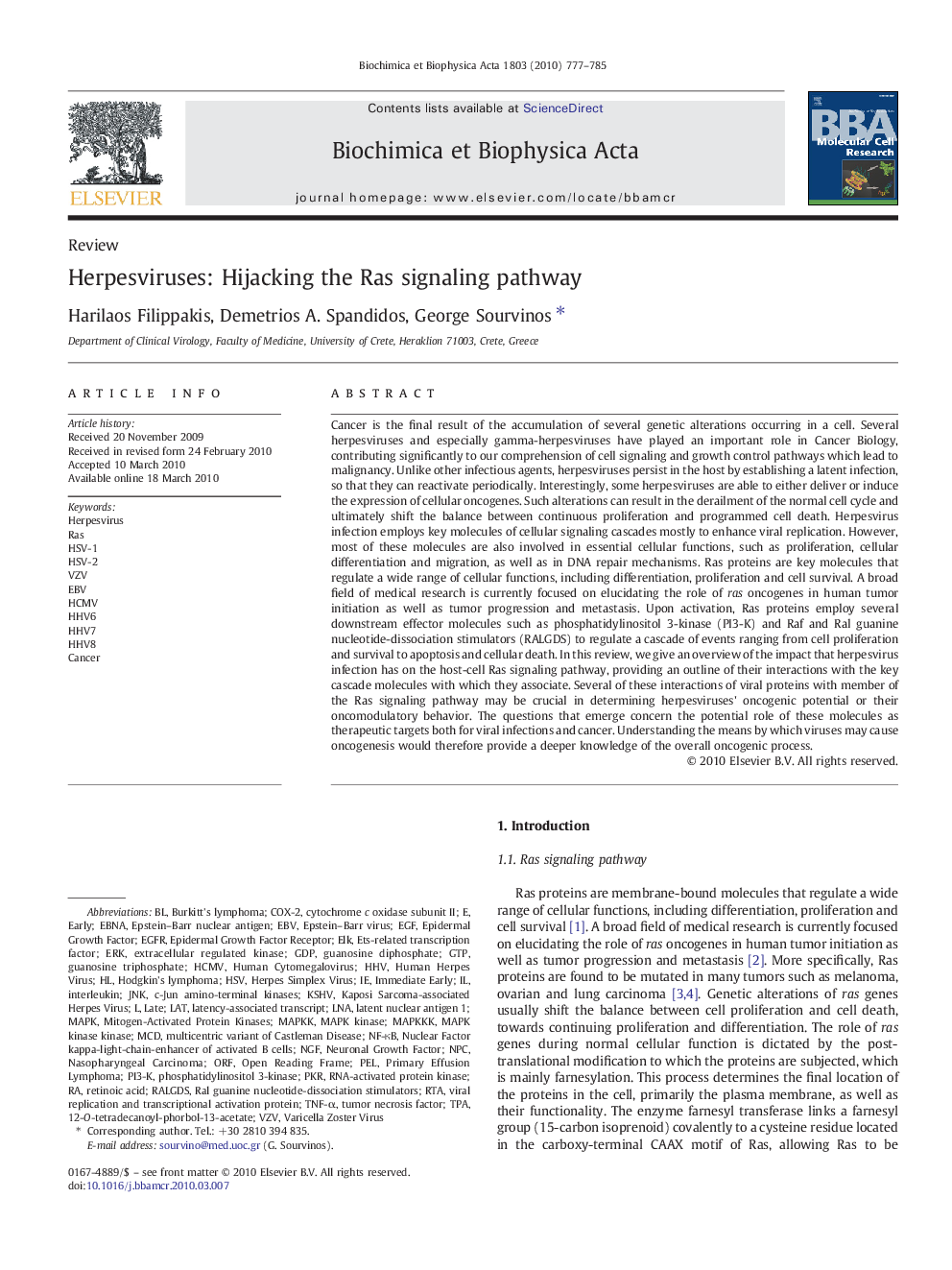| Article ID | Journal | Published Year | Pages | File Type |
|---|---|---|---|---|
| 10802904 | Biochimica et Biophysica Acta (BBA) - Molecular Cell Research | 2010 | 9 Pages |
Abstract
Cancer is the final result of the accumulation of several genetic alterations occurring in a cell. Several herpesviruses and especially gamma-herpesviruses have played an important role in Cancer Biology, contributing significantly to our comprehension of cell signaling and growth control pathways which lead to malignancy. Unlike other infectious agents, herpesviruses persist in the host by establishing a latent infection, so that they can reactivate periodically. Interestingly, some herpesviruses are able to either deliver or induce the expression of cellular oncogenes. Such alterations can result in the derailment of the normal cell cycle and ultimately shift the balance between continuous proliferation and programmed cell death. Herpesvirus infection employs key molecules of cellular signaling cascades mostly to enhance viral replication. However, most of these molecules are also involved in essential cellular functions, such as proliferation, cellular differentiation and migration, as well as in DNA repair mechanisms. Ras proteins are key molecules that regulate a wide range of cellular functions, including differentiation, proliferation and cell survival. A broad field of medical research is currently focused on elucidating the role of ras oncogenes in human tumor initiation as well as tumor progression and metastasis. Upon activation, Ras proteins employ several downstream effector molecules such as phosphatidylinositol 3-kinase (PI3-K) and Raf and Ral guanine nucleotide-dissociation stimulators (RALGDS) to regulate a cascade of events ranging from cell proliferation and survival to apoptosis and cellular death. In this review, we give an overview of the impact that herpesvirus infection has on the host-cell Ras signaling pathway, providing an outline of their interactions with the key cascade molecules with which they associate. Several of these interactions of viral proteins with member of the Ras signaling pathway may be crucial in determining herpesviruses' oncogenic potential or their oncomodulatory behavior. The questions that emerge concern the potential role of these molecules as therapeutic targets both for viral infections and cancer. Understanding the means by which viruses may cause oncogenesis would therefore provide a deeper knowledge of the overall oncogenic process.
Keywords
MAPKKKHCMVHHVKSHVRtaPKREBNARNA-activated protein kinaseMCDNPCPI3-KMAPKKNGFHSVLNAc-Jun amino-terminal kinasesEGFRNF-κBEGFJnkGTPORFRalGDSERKCOX-2MAPKMAPK kinaseMAPK kinase kinasePELEBVinterleukinGDPElklateRetinoic acidEarlyLATHuman cytomegaloviruscytochrome c oxidase subunit IIepidermal growth factorneuronal growth factornuclear factor kappa-light-chain-enhancer of activated B cellsPhosphatidylinositol 3-kinaseimmediate earlyopen reading frameBurkitt's lymphomaPrimary effusion lymphomaHodgkin's lymphomaEpstein–Barr virushuman herpes virusherpes simplex virusNasopharyngeal carcinomaextracellular regulated kinasemitogen-activated protein kinasesGuanosine triphosphateguanosine diphosphateEpidermal growth factor receptor
Related Topics
Life Sciences
Biochemistry, Genetics and Molecular Biology
Biochemistry
Authors
Harilaos Filippakis, Demetrios A. Spandidos, George Sourvinos,
